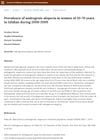 3 citations,
December 2016 in “Journal of epidemiological research”
3 citations,
December 2016 in “Journal of epidemiological research” Estrogen and androgenic hair increase melanoma risk, especially in European-ancestry individuals.
 January 2021 in “International journal of pharmaceutical research”
January 2021 in “International journal of pharmaceutical research” Sansevieria trifasciata P. extracts, especially the ethyl acetate fraction, effectively promote hair growth in male rabbits with hair loss.
 1 citations,
January 2023 in “Journal of Clinical Medicine”
1 citations,
January 2023 in “Journal of Clinical Medicine” A new hair restoration technology was found to effectively increase hair thickness, density, and growth, while reducing hair loss and improving scalp health, with no side effects.
January 2023 in “Pharmaceutics” AA–TF#15 significantly promotes hair regrowth and could be an effective treatment for androgenic alopecia.
 3 citations,
December 2019 in “Journal of Cosmetic and Laser Therapy”
3 citations,
December 2019 in “Journal of Cosmetic and Laser Therapy” PRGF treatments increased hair number and thickness in people with hair loss, with more injections leading to better results.
 23 citations,
January 1994 in “Skin Pharmacology and Physiology”
23 citations,
January 1994 in “Skin Pharmacology and Physiology” Hair loss in men and women is linked to high stress hormone levels and other hormonal imbalances, suggesting treatments should be customized to each person's hormones.
 January 2023 in “Vìsnik problem bìologìï ì medicini”
January 2023 in “Vìsnik problem bìologìï ì medicini” Androgenic alopecia causes hair follicle degradation and skin restructuring, but some hair elements remain.
 October 2010 in “Reproductive Biomedicine Online”
October 2010 in “Reproductive Biomedicine Online” Women with PCOS and androgenic alopecia have different triglyceride metabolism compared to those without hair loss.
February 2021 in “Медико-фармацевтический журнал "Пульс"” Understanding WNT signaling proteins can help predict and treat certain types of hair loss.
 2 citations,
December 2016 in “Journal of Pakistan Association of Dermatology”
2 citations,
December 2016 in “Journal of Pakistan Association of Dermatology” Almost 40% of women aged 20-70 in Isfahan had hair loss, with it being more severe in those with low ferritin levels.
 January 2024 in “Journal of Education, Health and Sport”
January 2024 in “Journal of Education, Health and Sport” Platelet-rich plasma therapy shows promise in treating hair loss caused by androgenic alopecia.
 September 2023 in “Journal of Cosmetic Dermatology”
September 2023 in “Journal of Cosmetic Dermatology” Topical cetirizine may help increase hair length in male pattern baldness and could be an alternative to minoxidil with fewer side effects.
 48 citations,
February 2014 in “Fertility and Sterility”
48 citations,
February 2014 in “Fertility and Sterility” Women with PCOS often have hair loss, which is linked to acne or excess body hair but not to worse hormone or metabolic issues.
 16 citations,
November 1992 in “Journal of International Medical Research”
16 citations,
November 1992 in “Journal of International Medical Research” ViviScal®, a food supplement, was found to be highly effective in treating hereditary hair loss in young males, while fish extract showed no impact.
 August 2024 in “Frontiers in Nutrition”
August 2024 in “Frontiers in Nutrition” Antioxidant-rich diets may reduce hair loss risk, while pro-inflammatory diets may increase it, especially in women.
Combining Hebai formula with minoxidil improves hair growth and reduces hair loss better than minoxidil alone.
 May 2012 in “15th International & 14th European Congress of Endocrinology”
May 2012 in “15th International & 14th European Congress of Endocrinology” Taking 1mg finasteride tablets for 6 months can lower good cholesterol (HDL) and raise triglycerides in men with hair loss.
September 2024 in “Fitoterapia” Camellia oleifera seed shell polyphenols and 1,3,6-tri-O-galloylglucose can help treat hair loss by reducing certain hormones and promoting hair growth.
 5 citations,
January 2018 in “Skin Pharmacology and Physiology”
5 citations,
January 2018 in “Skin Pharmacology and Physiology” Curcuma aeruginosa extract lotion significantly reduces underarm hair growth.
 4 citations,
May 2004 in “Facial Plastic Surgery Clinics of North America”
4 citations,
May 2004 in “Facial Plastic Surgery Clinics of North America” Hair transplantation helps women with hair loss; understanding and empathy lead to happy patients.
 1 citations,
April 1992 in “PubMed”
1 citations,
April 1992 in “PubMed” The document describes the signs of different common types of hair loss.
 January 2018 in “Figshare”
January 2018 in “Figshare” Curcuma aeruginosa extract lotion effectively reduces underarm hair growth.
 October 2023 in “Journal of Cosmetic Dermatology”
October 2023 in “Journal of Cosmetic Dermatology” A synthetic octapeptide may help promote hair growth and counteract hair loss.
 January 2016 in “Springer eBooks”
January 2016 in “Springer eBooks” The document concludes that there are various causes and treatments for hair loss, with hair transplantation being a notable option.
 70 citations,
February 2015 in “Expert Opinion on Drug Discovery”
70 citations,
February 2015 in “Expert Opinion on Drug Discovery” Topical drugs and near-infrared light therapy show potential for treating alopecia.
 59 citations,
August 1998 in “International Journal of Dermatology”
59 citations,
August 1998 in “International Journal of Dermatology” Genetics and hormones cause hair loss; finasteride treats it safely.
 33 citations,
September 2017 in “Molecules”
33 citations,
September 2017 in “Molecules” Red ginseng oil and its components help promote hair regrowth and could treat hair loss.
 14 citations,
December 2003 in “Medical Hypotheses”
14 citations,
December 2003 in “Medical Hypotheses” Male-pattern baldness might be caused by the effect of hormones on scalp blood vessels.
 April 2019 in “Advances in Cosmetic Surgery”
April 2019 in “Advances in Cosmetic Surgery” The document concludes that ongoing medical therapy is crucial for preventing hair loss, and surgical options can restore hair, with future treatments for hair loss being promising.
 November 2018 in “Journal of investigative dermatology, venereology and cosmetology”
November 2018 in “Journal of investigative dermatology, venereology and cosmetology” Biofield Energy Treatment, specifically The Trivedi Effect®, can potentially enhance hair growth by increasing the growth activity of human dermal papilla cells.

























